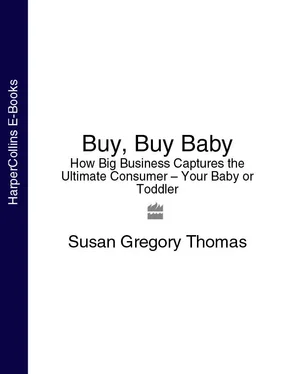By the time my child was born, shows such as Blue’s Clues, Dora the Explorer , and Clifford the Big Red Dog ruled the preschool airwaves, and the starring characters were licensed everywhere. Baby Einstein videos had become some of the most popular baby shower gifts in the country. As I, along with all the other new moms in my New York neighborhood, struggled into our new parental skin, I noticed that many were turning on these shows or videos of the baby-genius variety for their babies and toddlers. The general response in my urban, liberal, educated group seemed to be: “I don’t know if it’s going to make my baby into a genius, but he loves it, and it lets me take a shower.” The consensus was that it couldn’t hurt: we were all raised on TV, after all, and we didn’t turn out to be completely brain-dead. Many of the parents were uncertain that the Baby Einstein–type videos really would help stimulate their babies’ budding neurons. But if there really was something magic in them, how could we not show it to them?
You might think that because I had already done a fair amount of reporting in this area and interviewed experts at the top of this field I would be immune to such questions. You would be wrong. I was freaking out. Maybe those experts were just cynical academics, elitists who would rave about the virtues of wooden blocks until your eyes rolled. Maybe, in spite of my years covering technology, I was finally becoming a Luddite myself. And maybe it was better to let young children share the culture of their peers so they wouldn’t feel like hothouse orchids: pure and precious, unable to survive outside a rarefied environment. Finally, maybe mother really did know best. Maybe moms could sense something in their own children’s responses that no research psychologist would ever be able to tease out or interpret properly. That is, maybe Julie Aigner-Clark’s maternal instincts were better qualifications for grasping the infant mind than all those people with Ph.D.’s in child psychology.
But my background as a technology journalist seems to have saddled me with the curse and gift of extreme suspicion of marketing comeons. Having learned over the years that most marketing and PR campaigns are based on a lot of illusory fluff — and knowing what a sham lapware was — I couldn’t help wondering if the wool was being pulled over our newly maternal eyes with this stuff, too. Also, my memory was that television had generally been the purview of older kids, starting at around four. What, exactly, was the effect of toddler television and babies’ videos on the really little watchers?
But it wasn’t until my seventeen-month-old toddler first saw an Elmo video and within minutes memorized the “Elmo’s World” theme song and within days spotted Elmo on every licensed packaged product we encountered in the supermarket, bookstore, toy store, and library — and begun referring to these Elmo products as “Elmo diapers” or “Elmo books” — that I knew there was definitely something behind that friendly, furry face. I didn’t know what it was, but I felt it was worth looking into. This book is a report of what I found.
Конец ознакомительного фрагмента.
Текст предоставлен ООО «ЛитРес».
Прочитайте эту книгу целиком, купив полную легальную версию на ЛитРес.
Безопасно оплатить книгу можно банковской картой Visa, MasterCard, Maestro, со счета мобильного телефона, с платежного терминала, в салоне МТС или Связной, через PayPal, WebMoney, Яндекс.Деньги, QIWI Кошелек, бонусными картами или другим удобным Вам способом.





![Theresa Cheung - The Dream Dictionary from A to Z [Revised edition] - The Ultimate A–Z to Interpret the Secrets of Your Dreams](/books/692092/theresa-cheung-the-dream-dictionary-from-a-to-z-r-thumb.webp)






